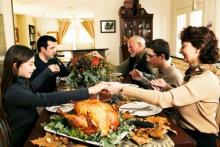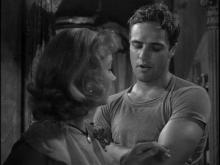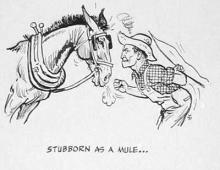The house stands on a bluff high above the street. It stares out at the street with its two plate glass eyes. Evergreen trees and dark purple bushes hide parts of the windows, making the eyes look half open, like a sleepy child’s. Whirligigs and birdhouses swarmed by tiny, noisy birds spin on thin strings from the ceiling of the porch. Its benches are covered with potted plants with waxy, large leaves. The swing is tethered by a rubber cord now, but still frets on its clanking metal hangings when the wind blows. Down in the ravine in front of the house, the tree leaves are turning orange and red, their outlines sharpening against the bright sky. The air is crisp and pungent—Halloweens and fresh Number 2 pencils are here in this smell of new possibility.
Ben, my mother’s boyfriend, carries his squash-a-role casserole, a dish made with pecans, yellow squash, and ricotta cheese, covered with aluminum foil. He wears a sweater over his button-down. My mom and I wear dress slacks and blouses underneath fall coats. I leave my Sand County Almanac in the car and we walk up the steep steps to the house. We walk inside.
My grandparents’ black cat named Blackie sits in wait for us when my grandma opens the door. The cat flicks her shiny tail back and forth like a serpent waiting for its prey. She will pounce; she’s done it before. My mom most often is her attack of choice, but, like a cop with more of affinity for donuts than for law, my grandma says they are only love bites.
My grandma gives us hugs as she ushers us into the house. She is a painfully thin woman, her shoulder blades dart like daggers against my hands.
The grandfather clock in the living room dings twelve times in its deep alto. The military clock running out of batteries in the kitchen rings noon a few second later with a warped rendition of the “Marines’ Hymn” on synthesized bugle. A chirping bird clock follows a few seconds after that. The chatter of the clocks every hour is in contrast with the deep quiet of the rest of the house. A gold brocade couch sits solidly in the living room. Thick green carpet muffles thudding footsteps. Dark wood paneled walls and built-in carpentry sucks in noise from old record players and radios. My grandparents’ knickknack taste is also in contrast with their house—Gregblehead golfers wobble in the front room, blown glass cat figurines glow in the light of the dining room, and stacks of Martha Stewart Living and TV Guide line the staircase in the kitchen.
“Everything’s just about ready,” my grandmother assures us, taking Ben’s squash-a-role from him.
“Can we do anything?” my mother asks.
“No, no,” she says like an admonishment. She is excessively self-reliant.
“Is Greg carving the turkey?” Ben asks. Ben has been my mother’s boyfriend for over ten years now. Her traditional parents see him as a relative with a title floating somewhere close to husband and son-in-law. His thinning hair is combed today and he looks like the CFO he once was before he retired.
“Yes,” my grandmother says, raising her eyebrows, and pursing her lips. We all remember the Thanksgiving many years ago when my grandpa sliced open his finger aggressively carving the bird and had to be rushed to the emergency room.
“Does he need any help?”
“No, no, just sit down.”
Ben sits. A turkey with a fold-out orange paper tail sits on top of a waxy tablecloth with pilgrim hats on it. My mom and I help bring out the food. A medium-sized bird with crispy pieces of skin. Green bean casserole brought out by my grandmother with her mother’s oven mitts. “Real” cranberries and the canned-sauce with its molded can shape and ridges for me. We dish up, say grace, and begin to eat—a routine we’ve learned at countless holidays and Sunday dinners.
My grandpa and Ben start in about golf. They talk about Tiger Woods winning this championship and that classic. He wins them all, it seems. This is the standard conversation starter--they are men and this is sport. As a retiree, Ben likes golf and bars.
“So, how is school going?” my grandmother asks. She went to nurse’s training in 1950 after high school. She wore a little white cap with a red ribbon and white apron dress over a striped shirt. She learned to care for people.
“Great,” I say, more interested in the cranberry sauce than in elaborating.
“How’s your roommate…Alice?... Edna?... Amanda?” my grandpa asks.
“Allison, Greg,” my grandma scolds him with a quick slap on his wrist and a pursed little smile.
“She’s fine,” I speak up loudly. He’s currently refusing a hearing aid. An outdoorsman all his life, he refuses aspects of old age. Getting a hearing aids, giving up bawdy jokes (his prize turkey feet on the back porch have their middle fingers pointed up), and slowing down don’t interest him. He’s given up some things. His old hunting dog died and he never got another. But mushrooms still sprout, ice still has fish under it, and manicured lawns still have eighteen holes.
“You like her?”
“She’s kind of high maintenance,” I lean in so he can hear me better.
“Oh really?” he asks, confused about the phrase’s connotation, but pretending he understands. He has extras of his favorite pairs of navy blue Velcro tennis shoes in the back room closet.
“Well, she’s from California, isn’t she?” my grandma asks.
My mom and I smirk. We all dig in, inducing food intoxication sans talking, intent on passing the hot things, and shoveling in mashed potatoes and meat. When we are through,
we settle our bloated stomachs into the backs of the chairs.
“We miss coming to see you in things,” my grandma says. They were in the audience since my first dance recital to my senior year graduation song. I am their only granddaughter and their prime entertainment. I feel the need to tap dance.
“I know,” I say. “It’s hard not having you there.”
And it is. My grandpa can’t wave to the audience, his Iowa Hawkeyes baseball cap at his feet, so I can’t blush and wave with a lowered hand back at him. Now, my grandma sends me clips about loans and opera along with letters about her day in the mail. She used to hand me an overstuffed envelope every time I saw her, as well as flowers from her garden wrapped in a wet paper towel and covered with a plastic bag and a rubber band.
“But you like it there? A lot?” asks Ben.
“I do. Really,” I say. How can I elaborate? Plato and music theory I can’t understand myself. Awkward encounters with new people are too embarrassing to think of. Friends from Boston and Chicago, places where they think the people are fast, loose, and slick, are very far from here.
Blackie comes and attacks my mother’s foot. Ben asks if she’s okay, but it’s just that love sometimes bites.









